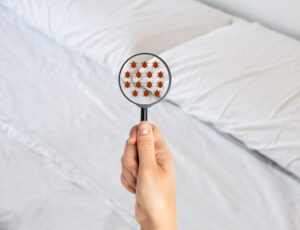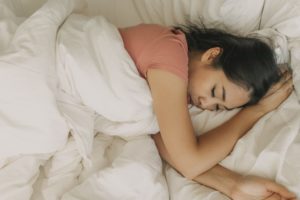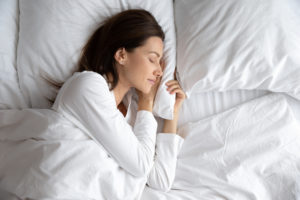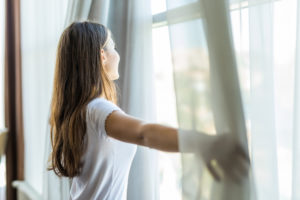How to Stay Awake
As many as one in four people feel so sleepy during the day that they have difficulty doing their work, schooling, or other important activities. People who have sleep disorders, work night shifts, or pull all-nighters often find themselves struggling to stay awake. While there is no replacement for getting the right amount of sleep, it is common to seek out ways to stay awake during class, at work, or while driving.
We cover several tips on how to stay awake, including ways to improve your morning routine and the best times for exercise or taking a power nap. We also address the benefits of a well-timed snack and offer suggestions for staying awake during class, work, and while driving.
Change Your Wake Up Routine
Just as a bedtime routine can help you fall asleep, having a consistent wake up routine helps you wake up on time feeling alert. To improve your morning routine, be sure to wake up at the same time every day, even on your days off. Keeping a consistent schedule will make it easier to wake up naturally and on time.
Get some sunlight as soon as possible after waking up. Exposure to bright light soon after rising can help you wake up and feel alert. However, if you work nights or live in the very northern or southern part of the world, you may not have access to natural light when you wake up. As an alternative to natural sunlight, using a light therapy box or visor can help you to feel less sleepy and more awake.
Go on a Walk
A quick break for some physical activity can help you feel more alert. Exercise releases endorphins in the brain that can raise your energy levels, improve your mood, and lessen pain.
Taking a short walk is linked to higher energy levels that may last for two hours or more after you finish exercising. Research has shown that regular exercise can even improve alertness in people with chronic health conditions like narcolepsy and chronic fatigue . As an added benefit, regular exercise helps you fall asleep faster at bedtime and improves the length and quality of your sleep.
Eat a Healthy Snack
Healthy food choices can help fight sleepiness. When you are trying to stay awake, try not to avoid meals just because you are tired. Low blood sugar can make you feel more worn out. If you do fall asleep after skipping a meal, hunger might wake you up earlier than you want.
While you may feel a temporary boost of energy after eating sugary snacks, high-sugar foods and beverages actually make you feel more tired over time. Instead, try having balanced meals containing protein and vegetables to help you stay alert. Fruits, vegetables, yogurt, eggs, nuts, fish, beans, and lean meats are all healthy food choices.
Finally, if you are trying to stay awake despite sleep loss, be sure to drink plenty of water. Dehydration can make you feel more tired.
Turn Up the Lights
Bright light strongly influences circadian rhythms. Sunlight helps keep the body’s internal clock on track, which can keep you feeling awake during the day. Taking a break outside can help you shake off your drowsiness and may improve your mood as well. If you cannot go outside, sit by a window or try a lamp that is designed to imitate natural light.
During night shifts, adjust lighting in your workplace to be as bright as possible. If the overhead lighting is too dim, consider using a portable light box. However, when you are not at work, follow sleep hygiene recommendations and sleep in a quiet, dark, and cool room

Grab Some Caffeine
Caffeine is a powerful stimulant that is commonly found in coffee, tea, soda, and energy drinks. It can make you feel more alert, less tired , and improve your concentration and energy. Coffee and tea are the most commonly used alertness-promoting substances in the world.
Caffeine’s effects on alertness and energy work by blocking adenosine within the brain. Adenosine is a naturally-occurring chemical that makes you feel sleepy. By blocking the effects of adenosine, caffeine excites your nervous system, leading to faster reactions, improved attention, and a better mood among other effects.
Caffeine starts working in about a half hour but its effects can last for many hours. The amount of caffeine in one cup of coffee or two cups of tea may keep you alert through a shift at work or a few hours at school. Be careful though, because caffeine can make it harder to fall asleep, so avoid caffeine within eight hours before you plan to go to bed.
While caffeine can help you stay awake in the short term, it should not take the place of regularly getting enough sleep. If you use large amounts of caffeine, you may find that caffeine no longer makes you feel as alert as it once did or that you need to take higher amounts to get the same effects.
Take a Power Nap
While napping in order to stay awake may sound counterintuitive, a short nap can help you feel more awake for several hours afterwards. Studies have found that people feel more alert and less sleepy after napping. However, naps should not take the place of regularly getting enough sleep. Napping too much can make it more difficult for you to fall asleep at night .
Health experts recommend limiting daytime naps to about 20 minutes at a time. Longer naps can actually make you feel groggier than short naps due to sleep inertia. Sleep inertia can leave you waking up from deep sleep feeling groggy, confused or in a bad mood. Sleep inertia usually lasts less than an hour, but may last longer if you are sleep deprived. Bright lights, washing your face, and caffeine may shorten sleep inertia.
The best times for a nap are in the early morning or mid-afternoon before 3 p.m. Napping closer to your desired bedtime may interfere with falling asleep on time .
Frequently Asked Questions
How Can I Stay Awake in Class?
To stay awake in class, pack a portable, low-carbohydrate snack and some water and take a few minutes to be active before you get to class. Physical activity during schooling has been linked to higher alertness, concentration, and focus among students from grade school to university. Between classes, as little as 5 to 10 minutes of physical activity can help boost your alertness.
How Can I Stay Awake at Work?
Working while tired is linked to a higher risk of poor job performance, work errors, accidents and injuries. Taking caffeine close to the end of a shift can make it more difficult to sleep after you get home from work. Instead, a single cup of coffee or tea at the start of a work shift may be more effective than spacing out small doses over the course of your day. A quick nap or caffeine before work may improve your alertness during a night shift. If still you feel tired during a shift, try mixing up what you are working on. Repetitive and boring work is just as bad for your level of alertness as being sleep deprived.
How Can I Stay Awake While Driving?
If you feel tired while driving, pull over and stop the car as soon as you can safely do so. Drowsy driving can be as dangerous as driving while intoxicated. A 20-minute nap can help improve alertness and safe driving ability. Caffeine may also help, but it may be less effective if you are very sleep deprived or if you regularly use caffeine. Cold air, food, non-caffeinated beverages, and listening to music have not been proven to prevent drowsy driving. If you know in advance that you may need to drive while tired, it is best to arrange to ride with a friend or coworker, take public transportation, or reschedule your drive.
How Can I Stay Awake After an All-Nighter?
While it may seem like a good idea to stay up all night for work or school, sleep loss can negatively affect your performance and increase your risk of accidents. A single all-nighter can interfere with your thinking, mental health, and judgment. If you cannot avoid an all-nighter, the best way to recover is to get enough sleep as soon as you can. Re-establish your bedtime and wake-up schedule as quickly as possible and avoid long daytime naps that interfere with bedtime sleep. Get physical activity, ideally in sunlight, eat low-carbohydrate meals, and drink plenty of water.
How Can I Stay Awake Without Caffeine?
As an alternative to caffeine, make sure to get as much bright light as possible, preferably natural sunlight. Make time for 5 to 10 minutes of physical activity. Eat a healthy, low-carbohydrate snack and drink water. Finally, try taking a 20-minute nap, but avoid napping for too long or too late in the day as it may make it harder for you to fall asleep at bedtime.

Still have questions? Ask our community!
Join our Sleep Care Community — a trusted hub of sleep health professionals, product specialists, and people just like you. Whether you need expert sleep advice for your insomnia or you’re searching for the perfect mattress, we’ve got you covered. Get personalized guidance from the experts who know sleep best.
References
13 Sources
-
Chervin, R. D. (2022, October 4). Approach to the patient with excessive daytime sleepiness. In T. E. Scammell (Ed.). UpToDate.
https://www.uptodate.com/contents/approach-to-the-patient-with-excessive-daytime-sleepiness -
National Institute for Occupational Safety and Health. (2020, April 1). Reducing risks associated with long work hours. Centers for Disease Control and Prevention.
https://www.cdc.gov/niosh/emres/longhourstraining/default.html -
Maski K. (2022, May 23). Insufficient sleep: Evaluation and management. In T. E. Scammell (Ed.). UpToDate.
https://www.uptodate.com/contents/insufficient-sleep-evaluation-and-management -
Johnston, B. D. (2021, August). Benefits of exercise. Merck Manual Consumer Version.
https://www.merckmanuals.com/home/fundamentals/exercise-and-fitness/benefits-of-exercise -
Thayer, R. E. (1987). Energy, tiredness, and tension effects of a sugar snack versus moderate exercise. Journal of Personality and Social Psychology, 52(1), 119-125.
https://pubmed.ncbi.nlm.nih.gov/3820066/ -
Maski, K., & Kotagal, S. (2022, September 19). Management and prognosis of narcolepsy in children. In T. E. Scammell & R. D. Chervin (Eds.). UpToDate.
https://www.uptodate.com/contents/management-and-prognosis-of-narcolepsy-in-children -
Fosnocht, K. M., & Ende, J. (2021, May 21). Approach to the adult patient with fatigue. In J. E. Elmore (Ed.). UpToDate.
https://www.uptodate.com/contents/approach-to-the-adult-patient-with-fatigue -
Schwab, R. J. (2022, May). Circadian rhythm sleep disorders. Merck Manual Professional Version.
https://www.merckmanuals.com/professional/neurologic-disorders/sleep-and-wakefulness-disorders/circadian-rhythm-sleep-disorders -
Cheng, P., & Drake, C. L. (2022, November 3). Sleep-wake disturbances in shift workers. In C. A. Goldstein (Ed.). UpToDate.
https://www.uptodate.com/contents/sleep-wake-disturbances-in-shift-workers -
Bordeaux, B., & Lieberman, H. R. (2022, June 2). Benefits and risks of caffeine and caffeinated beverages. In D. Seres (Ed.). UpToDate.
https://www.uptodate.com/contents/benefits-and-risks-of-caffeine-and-caffeinated-beverages -
Basit, H., Damhoff, T. C., & Huecker, M. R. (2022, June 7). Sleeplessness and circadian disorder. In StatPearls. StatPearls Publishing.
https://www.ncbi.nlm.nih.gov/books/NBK534238/ -
Chawla, J. (2022, August 31). Insomnia. Medscape.
https://emedicine.medscape.com/article/1187829-overview#showall -
Goldstein, C. A. (2022, April 5). Jet lag. In R. Benca (Ed.). UpToDate.
https://www.uptodate.com/contents/jet-lag










